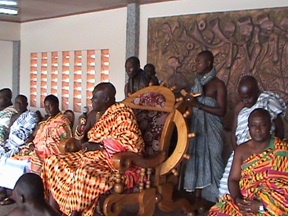The Omanhene of Sunyani Traditional Council has asked private health providers in Ghana to make their services affordable for more downtrodden persons to access good quality health care.
Nana Bosoma Asor Nkrawire II was apprehensive of the acts of some health professionals who are predisposed to concentrate more on the high class of people for economic interests at the expense of the lower class majority.
Nana Nkrawire II expressed these sentiments at the formal inauguration ceremony of new ultra-modern Rabito Clinic in Sunyani, Brong Ahafo Region. He asked private health operators to make their service charges more affordable to serve the indigent in the communities. He, therefore, made a passionate appeal to the Rabito Clinic to expand its branches to the other parts of the region.
The chief appealed to the private health facilities to put in much effort to help the Health Ministry to control the present cholera outbreak, and prevent the spread of the Ebola Virus Disease (EVD) to the country.
An Adjunct Professor at the University for Development Studies (UDS), Professor Edmund Delle, assured the chiefs and the people in the region that the purpose of Rabito Clinic was to open up and reach a large number of people within its catchment areas. Professor Delle extolled the traditional authorities and the Catholic Church for their immense contributions towards the establishment of Rabito Clinic.
He added that Rabito Clinic has established the outstanding Rabito Foundation to support patients who need quality health care, but could not afford to pay high charges to access the services. He encouraged patients to visit the clinic even when they do not have enough money to pay for the services in order to treat their sicknesses.
He informed all specialist doctors to make a meaning out of the purpose of their special services to the society. According to him, specialist doctors need to open up to make the communities feel their presence and avoid unbearable service charges to their clients when they come to them for treatment.
Health News of Tuesday, 30 September 2014
Source: Public Agenda
Access to health care must be for downtrodden

Entertainment















